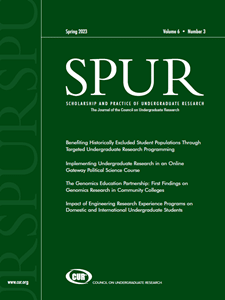SPUR (2023) 6 (3): https://doi.org/10.18833/spur/6/3/5
Recommended Citation: Chastain, Jaclyn, Santiago Luaces, Melodie Eichbauer, Charles Gunnels. Benefiting Historically Excluded Student Populations Through Targeted Undergraduate Research Programming. Scholarship and Practice of Undergraduate Research 6 (3): 4-8. https://doi.org/10.18833/spur/6/3/5
More Articles in this Issue
No posts found


